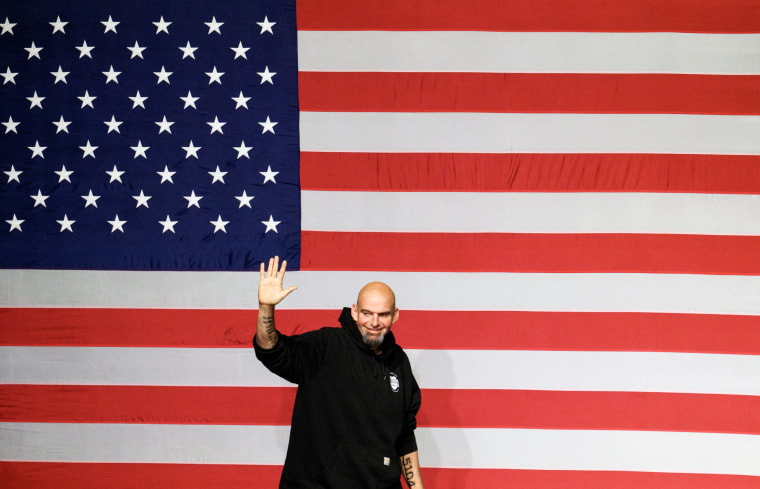Pennsylvania Democratic Lt. Gov. John Fetterman survived a bruising Senate campaign and overcame a serious stroke to prevail against Republican Mehmet Oz to claim his state’s open Senate seat Tuesday. Fetterman rebounded after having watched his double-digit lead in the summer evaporate into a dead heat after a near-disastrous debate performance two weeks before the election, in which he had trouble articulating sentences. At one point in the debate, Fetterman insisted he had always supported fracking, even when confronted with his own statements that indicated he didn’t support fracking two years ago.
He used his 6-foot-8 frame and biker persona — he campaigned in hoodies, shorts and tattoos — combined with the credential of a Harvard Kennedy School of Government degree to establish a blue-collar narrative shored up by leadership smarts.
Yet that stumble didn’t keep Fetterman from succeeding, because he was still better than Oz at selling himself as an authentic leader for Pennsylvanians. To someone who watched every step of his rise as a mayor from a steel city outside Pittsburgh from my perch at Steel City’s biggest newspaper, I saw how he was able to appeal to white working-class voters (the people who have left the Democratic Party in droves) at the same time he stayed mostly committed to his progressive politics. By using this formula and not conceding red counties to Republicans, he may give Democrats — who have instead increasingly targeted suburban swing voters — a new model for a path to victory.
Fetterman has moved almost seamlessly from a 13-year run as the small-town mayor of Braddock to the lieutenant governorship in 2019 to the U.S. Senate today. He used his 6-foot-8 frame and biker persona — he campaigned in hoodies, shorts and tattoos — combined with the credential of a Harvard Kennedy School of Government degree to establish a blue-collar narrative shored up by leadership smarts. That helped his image remain unstained by airings of his history of living off his parents’ wealth for much of his adult life. I thought that revelation might hurt him, but it apparently didn’t — perhaps because those who have struggled financially could relate to needing family help to get by.
That also might explain why the aftereffects of a life-threatening stroke in May that restricted his campaigning didn’t sink his candidacy. He asked in rallies whether others had ever battled health challenges, and most raised their hands that they had, suggesting the message of facing obstacles resonated with them.
Oz’s attack on Fetterman’s refusal to release his medical records did hurt him. Oz released his records a few days after a Post-Gazette editorial asked both candidates to do so, but Fetterman never did. However, the negatives surrounding Oz — chiefly his image as a slick, out-of-touch New Jersey resident who parachuted into Pennsylvania to grab a Senate seat — proved too much to overcome.
Lingering allegations that Oz as a celebrity talk show host amassed some of his fortune by peddling products of dubious medical value also tainted his reputation. They might also explain why Fetterman’s own financial question marks didn’t do him more damage.
Want more articles like this? Follow THINK on Instagram to get updates on the week’s most important political analysis
The ideological chasm between the two candidates framed the campaign, as Fetterman supports a big increase in the minimum wage and “Medicare for All,” even as he tempered his progressive agenda with — in a possible election-year conversion — more right-leaning policies like fracking. Fetterman has also vowed to put a high priority on union rights and abortion rights, while Oz took the opposite stands.
But even these distinctions largely descended into a battle of political labels rather than a focus on the policies themselves. While Oz tried to exploit the pair’s ideological differences by calling Fetterman “extreme” and “radical” over and over, Fetterman’s portrayal of Oz as a “liar” was the label that stuck most sturdily.
In the end, though, I think most people were satisfied that Fetterman would at least vote the right way and not impede the Biden agenda, regardless of his health.
Part of Fetterman’s appeal is that he’s not a schmoozer — and he doesn’t have to become one. Nor does he need to sacrifice his ideals. But to deliver as a senator, he will need to get along with people to form alliances that move the needle, and that won’t be easy in a fractious Congress. As a small-town mayor and lieutenant governor, a position with few official responsibilities, Fetterman could go it alone; he won’t be able to in the U.S. Senate if he wants to deliver for the people of Pennsylvania.
